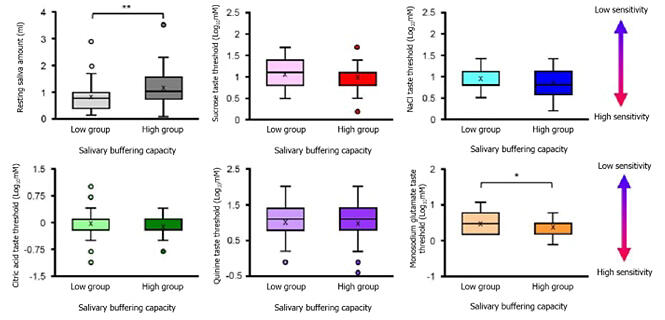A research group led by Professor Ryusuke Yoshida of the Department of Oral Physiology, Faculty of Medicine, Dentistry and Pharmaceutical Sciences (Dentistry) at Okayama University, examined the relationships between salivary buffering capacity and sensitivity to various tastes in healthy Japanese students. They found that sour taste sensitivity does not have a clear correlation with salivary buffering capacity although it was considered to correlate with buffering capacity and that only umami sensitivity has a correlation. Yoshida commented, "Eating delicious food is a desire shared by all humankind. Secreting more saliva may improve the taste of food. We will continue to conduct a wide range of research on taste." This work was published in Archives of Oral Biology.

Provided by Okayama University
Saliva performs multiple and diverse functions in the oral cavity. Among these, salivary buffering capacity is considered to be involved in preventing teeth from being dissolved by acids and mitigating tissue damage by neutralizing acids and alkalis in the mouth. Buffering capacity may also interfere with sour taste, as it reduces acidity.
Therefore, the research group investigated the relationship between salivary buffering capacity and taste sensitivity. With the cooperation of 87 students (43 men and 44 women; mean age: 21.7 years old) from Okayama University Dental School, the researchers measured salivary secretion at rest, salivary buffering capacity, and recognition thresholds for five basic tastes (sweet, umami, salty, sour, and bitter) and analyzed their relationships. The results showed a correlation indicating that umami sensitivity increases with salivary buffering capacity. However, salivary buffering capacity had no such correlation with other tastes, including sour.
This finding indicates that salivary buffering capacity may affect sensitivity to umami taste. Salivary buffering capacity has been considered to be involved in protecting teeth from acidic conditions and preventing tooth decay. The results of this study show that it can also affect taste perception. In particular, saliva may be crucial in making food more palatable, as higher salivary buffering capacity was associated with an increased perception of umami taste, which is related to food deliciousness (palatability). Adequate saliva production may be important to better grasp the taste of food.
Journal Information
Publication: Achieves of Oral Biology
Title: Salivary buffering capacity is correlated with umami but not sour taste sensitivity in healthy adult Japanese subjects
DOI: 10.1016/j.archoralbio.2024.106013
This article has been translated by JST with permission from The Science News Ltd. (https://sci-news.co.jp/). Unauthorized reproduction of the article and photographs is prohibited.




